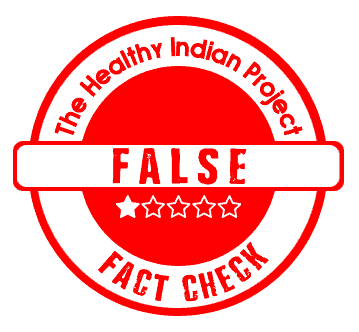Quick Take
A social media post claims that eating as much watermelon helps in fat loss. We fact checked and found the claim to be False.

The Claim
In an Instagram video by profoundly_m3, a fitness trainer, who posts videos about exercise and makes video about diet and fat loss, asserted that eating abundant amounts of watermelon contributes to fat loss.

Fact Check
What is the nutritional value of watermelon?
Watermelon is a hydrating fruit with a low calorie content. It is rich in vitamins A and C, as well as antioxidants like lycopene, which may help protect against certain diseases. However, watermelon has a high glycemic index (GI), meaning it can cause a rapid increase in blood sugar levels. Despite this, its glycemic load (GL), which takes into account both the quantity and quality of carbohydrates in a serving of food, is relatively low due to its high water and fibre content. This means that while watermelon may cause a spike in blood sugar, its overall impact on blood sugar levels is moderate.
Can eating as much watermelon as you want helps in weight loss?
No, Consuming too much watermelon can potentially lead to adverse effects due to its high water content and natural sugars. Over consumption may cause digestive discomfort such as bloating, gas, and diarrhoea, especially in individuals with sensitive stomachs or those prone to gastrointestinal issues. Additionally, excessive intake of watermelon can contribute to an imbalance in electrolytes, particularly if consumed in large quantities without adequate hydration from other sources. Therefore, moderation is key when incorporating watermelon into your diet. Furthermore, while watermelon is low in calories and can be part of a healthy diet, consuming it in excess without considering overall calorie intake and physical activity levels may contribute to weight gain. Despite its high water content, watermelon still contains natural sugars, which can add up in calories if consumed excessively. As with any food, portion control and moderation are important factors to consider for weight management.

Experienced nutritionist Dr. Swati Dave, (Ph.D. in Food and Nutrition) said “Watermelon is a thirst-quenching fruit with few macronutrients, including protein and fat. Also, it contains nutrients such as lycopene, citrulline, and vitamins A, C. Extreme, restricted diets and cleanses are not advisable during the summer heat. It’s not healthy to eat as much watermelon as you can without limits. Large amounts of watermelon might cause diarrhea in many cases. It is a high-GI fruit and is not recommended for diabetics.”
How does incomplete or incorrect health information harm people?
Misinformation about health can harm people by leading to unhealthy choices, delaying proper treatment, and causing unnecessary stress. It’s important to rely on accurate information for better health decisions.
Dr. Dave, further warns about the dangers of weight loss misinformation. She likens it to a virus spreading rapidly on the internet, with captivating captions promising quick fixes and false claims. Deceptive information sets unrealistic expectations, leading people to adopt ineffective or harmful practices that hinder sustainable and healthy weight loss. Dr. Dave emphasises the importance of critically evaluating online content, seeking evidence-based advice, and avoiding misleading trends lacking scientific support.

Dietician Harita highlights that there’s no one-size-fits-all approach to weight loss. She points out common weight loss misconceptions:
- Belief in needing a gluten-free diet for weight loss.
- Cutting out all fats for quick weight loss.
- Thinking fad diets like intermittent fasting and detox diet are the best solution.
- Believing in the effectiveness of a 7-day mono diet.
- Relying on supplements for weight loss.
- Blaming carbohydrates for weight gain.
- Insisting on eating breakfast for weight loss.
- Opting for a high-protein diet for rapid weight loss.
- Eliminating all sugars from the diet.
- Believing artificial sweeteners are healthy.
- Thinking social life must be sacrificed while dieting.
- Trusting in lukewarm drinks for weight loss, among others.
We have previously fact-checked whether consuming modern market watermelon leads to cancer or not.
Disclaimer: Medical Science is an ever evolving field. We strive to keep this page updated. In case you notice any discrepancy in the content, please inform us at [email protected]. You can futher read our Correction Policy here. Never disregard professional medical advice or delay seeking medical treatment because of something you have read on or accessed through this website or it's social media channels. Read our Full Disclaimer Here for further information.

